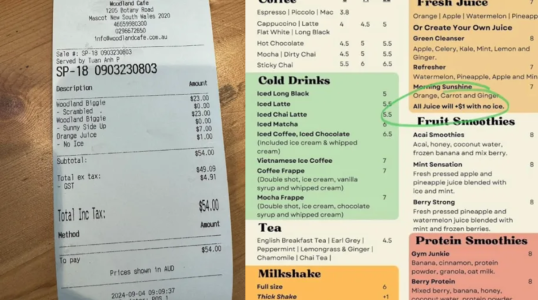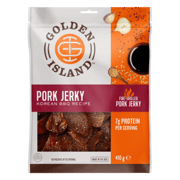Café's $1 surcharge draws mixed reaction—sneaky move or necessary cost?
By
- Replies 27
In the land down under, where the coffee culture is as robust as a finely brewed espresso, a Sydney café has stirred up a storm in a teacup over a $1 surcharge that's left customers with a frosty reception.
The Woodland Café, nestled in the heart of Sydney, has been the centre of a heated debate after imposing a $1 charge on customers who prefer their drinks without ice.
The cost-of-living crisis has sharpened Aussies' focus on their expenditures, and unexpected surcharges are being scrutinised more than ever.
The Woodland Café explained that the surcharge is due to the need to use more juice to fill the cup when ice is omitted.
They argue that ice typically occupies about one-seventh of the glass's volume, and without it, they're pouring more product into each drink.
The juice costs $7, and the café has been transparent about the charge, listing it clearly on the menu.
However, this has kept some customers from feeling that the surcharge doesn't quite pass the 'pub test.'
The debate has spilled over onto social media, with comments ranging from supportive to outraged.
‘Ice costs restaurants and cafes money. Some have expensive ice machines, and they make it themselves.’ one wrote.
‘Others buy ice...If you don't want ice, you're saving the cafe money. It should even out,’
‘It's a sneaky charge, I agree. Sneaky either way and cafes get away with these sneaky charges because customers don't ask or challenge them,’ another customer echoed.
‘You are technically getting more juice, but wow. That's crazy. I have never seen that ever,’ a third person added.
‘It's gross. They are charging more than enough to cover their costs. Do not normalise this. Would two ice cubes be sufficient ... without the cost?’ a different person chimed in.
On the other hand, many have defended the café, acknowledging that the extra juice adds up and that businesses need to cover their expenses.
The hospitality industry faces a tough climate, with venues closing alarmingly.
Customers are tightening their belts as inflation remains high, and business owners are feeling the pinch with rising rent, supplies, and wage costs.
A recent report from CreditorWatch has painted a grim picture, forecasting that one in every 11 hospitality businesses could close their doors for good in the next 12 months.
With such a challenging backdrop, the industry has been cautioned about the surcharges it applies.
Sandy Fitzgerald, a senior lecturer in marketing at RMIT, has advised that additional costs during tough financial times can permanently drive customers away.
‘Businesses argue that surcharges keep their doors open because the operating costs of running a business on certain days are higher (mainly wage-related),’ she said.
‘However, many people have criticised restauranteurs for charging exorbitant surcharges yet failing to deliver good service experiences.’
‘In turn, customers avoid dining during these periods, meaning less income for the business.’
She suggested that businesses examine their operating costs and find creative ways to improve profit margins rather than relying on surcharges.
This isn't the first time a café has been in the spotlight for unusual surcharges.
Earlier this year, another café charged a customer $1 to warm a muffin, and a Perth café added a 90-cent fee to toast a sandwich.
A Melbourne business even implemented a 10 per cent 'peak season surcharge' during the busy December-January period.
A café customer in Melbourne was taken aback when a 15 per cent surcharge was added to the price of his cappuccino on a public holiday, plus an extra fee for using his card.
Outraged customers took to social media to voice their concerns, questioning the reason behind such steep surcharges. You can read more about it here.
 Have you encountered similar surcharges at your local eateries? We invite you to share your thoughts and experiences in the comments below.
Have you encountered similar surcharges at your local eateries? We invite you to share your thoughts and experiences in the comments below.
The Woodland Café, nestled in the heart of Sydney, has been the centre of a heated debate after imposing a $1 charge on customers who prefer their drinks without ice.
The cost-of-living crisis has sharpened Aussies' focus on their expenditures, and unexpected surcharges are being scrutinised more than ever.
The Woodland Café explained that the surcharge is due to the need to use more juice to fill the cup when ice is omitted.
They argue that ice typically occupies about one-seventh of the glass's volume, and without it, they're pouring more product into each drink.
The juice costs $7, and the café has been transparent about the charge, listing it clearly on the menu.
However, this has kept some customers from feeling that the surcharge doesn't quite pass the 'pub test.'
The debate has spilled over onto social media, with comments ranging from supportive to outraged.
‘Ice costs restaurants and cafes money. Some have expensive ice machines, and they make it themselves.’ one wrote.
‘Others buy ice...If you don't want ice, you're saving the cafe money. It should even out,’
‘It's a sneaky charge, I agree. Sneaky either way and cafes get away with these sneaky charges because customers don't ask or challenge them,’ another customer echoed.
‘You are technically getting more juice, but wow. That's crazy. I have never seen that ever,’ a third person added.
‘It's gross. They are charging more than enough to cover their costs. Do not normalise this. Would two ice cubes be sufficient ... without the cost?’ a different person chimed in.
On the other hand, many have defended the café, acknowledging that the extra juice adds up and that businesses need to cover their expenses.
The hospitality industry faces a tough climate, with venues closing alarmingly.
Customers are tightening their belts as inflation remains high, and business owners are feeling the pinch with rising rent, supplies, and wage costs.
A recent report from CreditorWatch has painted a grim picture, forecasting that one in every 11 hospitality businesses could close their doors for good in the next 12 months.
With such a challenging backdrop, the industry has been cautioned about the surcharges it applies.
Sandy Fitzgerald, a senior lecturer in marketing at RMIT, has advised that additional costs during tough financial times can permanently drive customers away.
‘Businesses argue that surcharges keep their doors open because the operating costs of running a business on certain days are higher (mainly wage-related),’ she said.
‘However, many people have criticised restauranteurs for charging exorbitant surcharges yet failing to deliver good service experiences.’
‘In turn, customers avoid dining during these periods, meaning less income for the business.’
She suggested that businesses examine their operating costs and find creative ways to improve profit margins rather than relying on surcharges.
This isn't the first time a café has been in the spotlight for unusual surcharges.
Earlier this year, another café charged a customer $1 to warm a muffin, and a Perth café added a 90-cent fee to toast a sandwich.
A Melbourne business even implemented a 10 per cent 'peak season surcharge' during the busy December-January period.
A café customer in Melbourne was taken aback when a 15 per cent surcharge was added to the price of his cappuccino on a public holiday, plus an extra fee for using his card.
Outraged customers took to social media to voice their concerns, questioning the reason behind such steep surcharges. You can read more about it here.
Key Takeaways
- An Australian cafe has defended its decision to impose a $1 surcharge for drinks without ice, attributing it to the extra juice needed to fill the cup.
- Customers have expressed varying opinions on the surcharge, with some calling it out as 'ludicrous' and 'sneaky,' while others acknowledge the cost implications for the cafe.
- The cost-of-living crisis and high operating costs in the hospitality industry impact consumers and business owners, leading to closures and careful consideration of applied surcharges.
- Experts suggested restaurants should examine operating costs and think creatively to improve profit margins rather than relying on surcharges to balance their finances.








